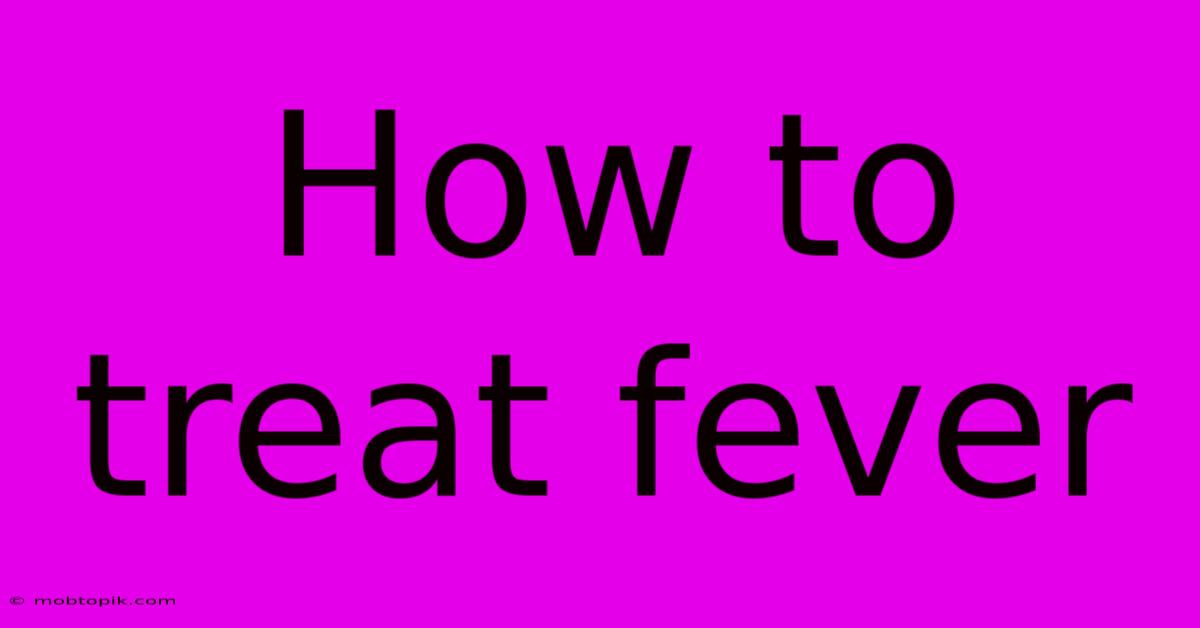How To Treat Fever

Discover more detailed and exciting information on our website. Click the link below to start your adventure: Visit Best Website mobtopik.com. Don't miss out!
Table of Contents
How to Treat a Fever: A Comprehensive Guide
A fever, characterized by a body temperature above the normal range (generally considered 98.6°F or 37°C), is a common symptom indicating your body's fight against infection or illness. While a fever itself isn't usually a cause for serious concern, understanding how to treat it effectively and when to seek professional medical attention is crucial. This comprehensive guide will walk you through various aspects of fever management, from home remedies to when to see a doctor.
Understanding Fevers: Causes and Symptoms
Before diving into treatment, it's important to grasp what causes a fever and how it manifests. Fevers are typically triggered by the body's immune response to infections, such as:
- Viral infections: The common cold, flu, and viral gastroenteritis are frequent culprits.
- Bacterial infections: Bacterial pneumonia, strep throat, and urinary tract infections can also cause fevers.
- Other illnesses: Certain inflammatory conditions, autoimmune disorders, and even some cancers can lead to fever.
Recognizing the symptoms associated with a fever is vital. Beyond the elevated temperature, you might experience:
- Sweating: Profuse sweating, especially at night, is a common symptom.
- Chills: Feeling cold and shivering, despite a high temperature.
- Headache: A throbbing headache is frequently associated with fever.
- Muscle aches: Body aches and pains are common, particularly with viral infections like the flu.
- Fatigue: Feeling unusually tired and weak.
- Loss of appetite: Reduced desire to eat.
- Nausea and vomiting: These are more common with certain illnesses, like gastroenteritis.
Treating a Fever at Home: Safe and Effective Methods
For most people, a fever can be managed effectively at home. The key is to focus on comfort and supporting your body's natural healing process. Here are several strategies:
1. Rest and Hydration: The Cornerstones of Recovery
Rest is paramount. Your body needs energy to fight off infection. Avoid strenuous activity and get plenty of sleep. Hydration is equally crucial. Fever can lead to fluid loss through sweating, so drink plenty of clear fluids like water, clear broths, or electrolyte solutions. Avoid sugary drinks, as they can worsen dehydration.
2. Over-the-Counter Medications: Easing Discomfort
Over-the-counter (OTC) medications can help manage fever symptoms. Acetaminophen (Tylenol) and ibuprofen (Advil, Motrin) are commonly used. Always follow the dosage instructions carefully, and never exceed the recommended amount. Do not give aspirin to children or teenagers due to the risk of Reye's syndrome.
3. Cool Compresses: Reducing Body Temperature
Cool compresses can provide temporary relief from fever-related discomfort. Apply cool, damp cloths to your forehead, neck, or wrists. Avoid using ice packs directly on the skin, as this can cause vasoconstriction and potentially worsen the situation. A lukewarm bath or sponge bath can also help lower your temperature.
4. Light Clothing and Comfortable Environment: Promoting Heat Dissipation
Dress in lightweight, loose-fitting clothing to allow your body to regulate its temperature. Keep your environment cool and well-ventilated. Opening windows or using a fan can help.
5. Herbal Remedies: Exploring Natural Options (Consult a doctor before use)
Some individuals turn to herbal remedies for fever relief. However, it's crucial to consult your doctor before using any herbal remedies, as they can interact with other medications or have potential side effects. Some commonly mentioned options include chamomile tea and elderberry syrup, but their efficacy requires further research.
When to Seek Medical Attention: Recognizing Warning Signs
While many fevers resolve on their own with home care, certain situations warrant immediate medical attention. Seek medical help if:
- Fever is very high (over 104°F or 40°C): This indicates a potentially serious infection.
- Fever persists for more than 3-5 days: Prolonged fever suggests the infection isn't resolving.
- Fever is accompanied by severe symptoms: This includes difficulty breathing, stiff neck, severe headache, rash, confusion, seizures, or persistent vomiting.
- Fever occurs in infants (under 3 months): Infants are especially vulnerable to serious infections.
- Fever returns after seeming to improve: This could indicate a relapse or a secondary infection.
- You have underlying health conditions: Pre-existing medical conditions can make you more susceptible to complications from fever.
Preventing Fevers: Proactive Steps
While you can't entirely prevent all fevers, practicing good hygiene and maintaining a healthy lifestyle can significantly reduce your risk. This includes:
- Regular handwashing: This is crucial in preventing the spread of infections.
- Vaccination: Getting vaccinated against preventable illnesses like the flu and pneumonia significantly reduces your chances of developing a fever.
- Healthy diet and exercise: A strong immune system is your best defense against infections.
- Adequate sleep: Sufficient sleep allows your body to repair and fight off illness effectively.
Conclusion: A Holistic Approach to Fever Management
Treating a fever effectively involves a combination of home care, symptom management, and knowing when to seek professional medical attention. By understanding the causes, symptoms, and appropriate responses, you can navigate fever episodes safely and effectively. Remember, rest, hydration, and appropriate medication are key components of successful fever management. Always consult your doctor if you have any concerns about a fever or its associated symptoms. They can provide personalized advice based on your individual health status and circumstances.

Thank you for visiting our website wich cover about How To Treat Fever. We hope the information provided has been useful to you. Feel free to contact us if you have any questions or need further assistance. See you next time and dont miss to bookmark.
Also read the following articles
| Article Title | Date |
|---|---|
| How To Treat Illness | Nov 29, 2024 |
| How To Treat Mental Illness | Nov 29, 2024 |
| How To Treat Wounds | Nov 29, 2024 |
| How To Treat Viral Infections | Nov 29, 2024 |
| How To Treat Depression | Nov 29, 2024 |
